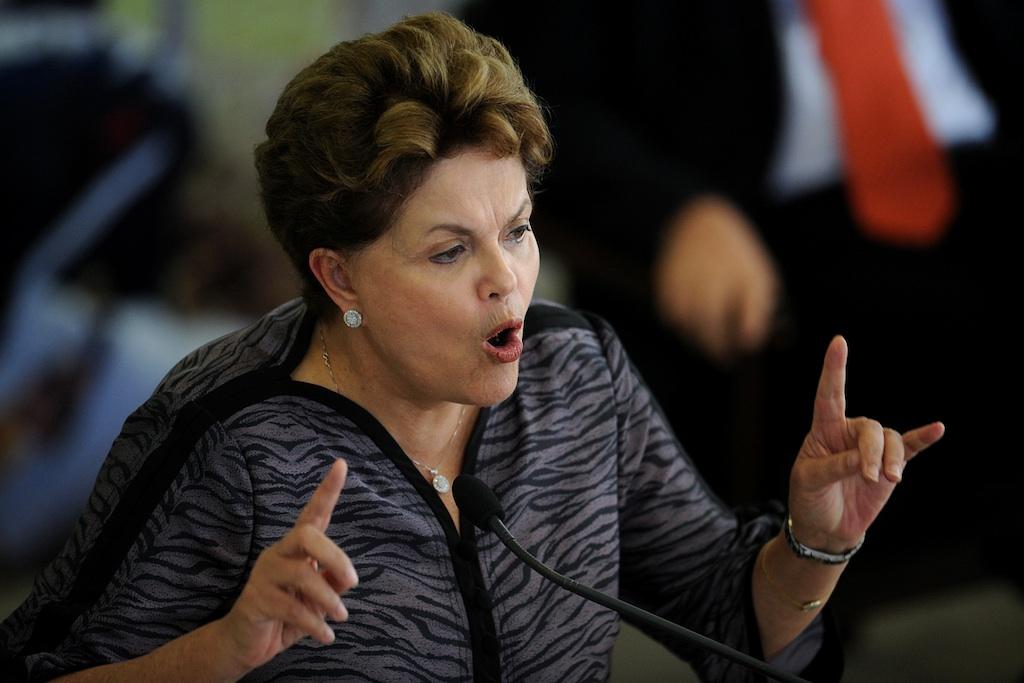Dilma fights accusations of selling out, risks losing party support
Brazilian President Dilma Rousseff delivers a speech during the launching of PRONACAMPO — a Federal Government program to improve education policies in rural areas where the illiteracy rate is high, at Planalto Palace in Brasilia, on March 20, 2012.
RIO DE JANEIRO, Brazil — When it came to rights – land, LGBT and otherwise – March really wasn’t Brazilian President Dilma Rousseff’s month.
Things started out righteously enough for Brazil’s first female president. On March 8, International Women’s Day, Rousseff received the prestigious Bertha Lutz Award, which recognized her “tireless work toward women’s rights in Brazil.” She also issued a call to action for women’s rights, imploring her “sisters in the struggle” to “be the eyes and ears of the nation … to seek out justice.”
Plus, Rousseff’s administration was still reaping the benefits of recently leaked photos that depicted her resisting interrogation during the military dictatorship – after having been tortured for 22 days straight. The iconic image, which instantly went viral, lent further credit to Rousseff’s persona as a long-term champion of human rights and social justice.
But a recent spate of assassinations have driven a wedge between land rights activists and the Rousseff administration. In a single day, four members of the country’s Landless Workers’ Movement (MST) were assassinated throughout the country. The MST, which seeks agrarian reform through occupying and legally reappropriating uncultivated arable land, is widely cited as Latin America’s largest social movement, with over two million members mobilized toward agrarian reform in Brazil’s rural areas.
More from GlobalPost: Land activist killings being investigated in Brazil
Watchdog groups have accused nearby landowners of paying hired gunmen to shoot the activists, though police have yet to name any suspects or indicate foul play.
Activists argue that President Rousseff’s administration has slowed the progress of agrarian reform in the country, and that the recent events show she hasn’t made good on promises to end corruption and impunity for such political assassinations. InSight Crime reports that in 2011 the lowest number of landless families were settled — or awarded legal government status as landowners — in 16 years.
Since taking office, Rousseff’s legislative track record on land rights has been controversial. Brazil’s Congress has recently put forth a new iteration of the country’s Forestry Code, which serves as the country’s primary governing document on land preservation, development and resource exploration. Environmentalists see the new language as catering exclusively to the special interests of multinational agribusiness, as it offers amnesty to past violators, lowers the quota of legally protected rainforest and cuts into land that had been previously earmarked for permanent preservation.
As environmental activists lean hard on Rousseff to veto the code before it becomes law, she has remained tight-lipped.
Rousseff exacerbated tensions by telling journalists ahead of the Rio+20 UN Sustainable Development conference that the country should serve as a model of “realism” regarding environmental and economic development and that there “is just no room for fantasies anymore."
More from GlobalPost: In Rio+20 run-up, activists form People’s Summit
According to critics, including fellow Workers’ Party members, President Rousseff risks losing both party and public support if she doesn’t start making meaningful strides toward land reform and preservation. Last year Rousseff authorized construction of the highly controversial Belo Monte hydroelectric plant, which will flood 258 square miles – an area larger than the Panama Canal – and will thereby expel more than 40,000 indigenous Brazilians and will destroy the habitats of hundreds of species unique to the area. Plans for the dam have been kicking around since 1975, but were so controversial that they remained shelved for decades.
March also proved especially chilly for the Rousseff administration’s relations with the LGBT community, a group that initially offered her immense public support. If land rights opposition came through dense rebuttals of allegedly nefarious legislation, LGBT-related criticisms got straight to the point.
The Gay Oscars, a nationally covered event organized by LGBT groups throughout the nation, awarded President Rousseff with the grand prize of “Homosexuals’ Enemy.” The event, now in its 22nd year, has never before named a Brazilian president for this “honor.”
President Rousseff received the landmark distinction, according to anthropologist and LGBT activist Luiz Mott, due to her “shocking lack of public policies including LGBTs and for vetoing the anti-homophobia kit proposed by the Ministry of Education.”
National Congressman Jean Wyllys closed out the month by calling the current administration “cowardly and outright neglectful of minorities.” In a now-viral interview with Terra Magazine, Congressman Wyllys slammed the administration for “extorting” LGBT votes only to fall prey to “cowardice” on polemic issues. “Minorities are being outright neglected by this government,” he said.
“The reality is that … she’s deceived us and has abandoned historical Workers’ Party politics to avoid confrontation with religious conservatives in Congress,” said Congressman Wyllis.
The story you just read is accessible and free to all because thousands of listeners and readers contribute to our nonprofit newsroom. We go deep to bring you the human-centered international reporting that you know you can trust. To do this work and to do it well, we rely on the support of our listeners. If you appreciated our coverage this year, if there was a story that made you pause or a song that moved you, would you consider making a gift to sustain our work through 2024 and beyond?
